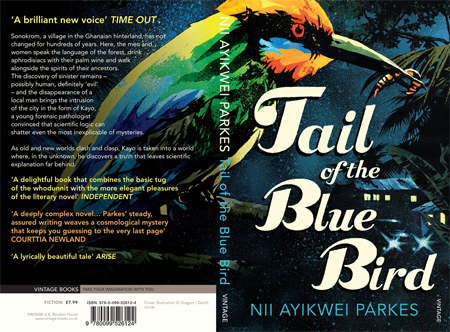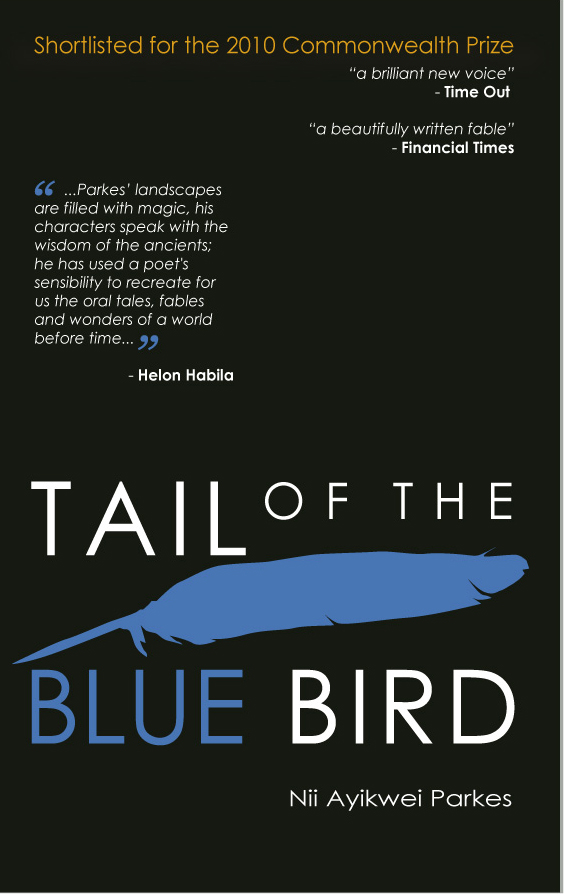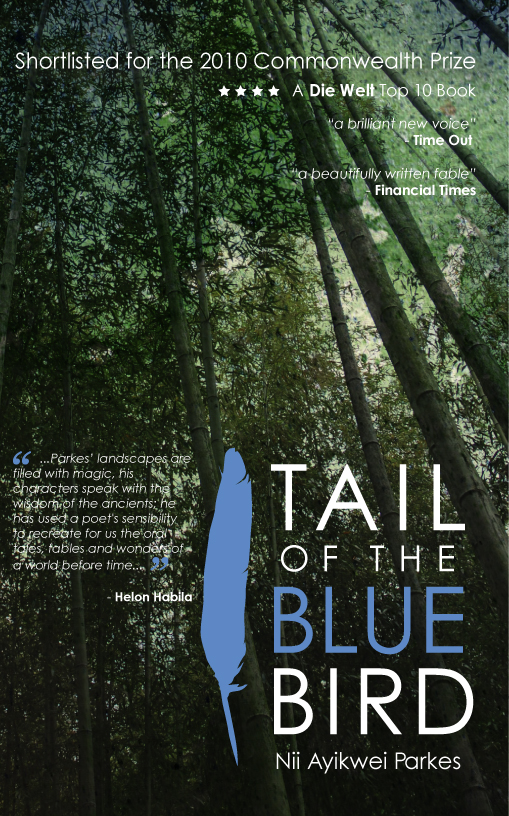Nii Ayikwei Parkes’ début novel, shortlisted for the Commonwealth Prize, and hailed by the Financial Times as ‘a beautifully written fable… simple in form, but grappling with urgent issues.’ The leading US early reviews magazine, Publishers Weekly, describes the novel as “a beguiling exploration of the power of storytelling–ancient stories and humble, modern and official.”
 A beautiful meditation on the relationship between old and new worlds in developing Africa.
A beautiful meditation on the relationship between old and new worlds in developing Africa.
Sonokrom, a village in the Ghanaian hinterland, has not changed for thousands of years. Here, the men and women speak the language of the forest, drink aphrodisiacs with their palm wine and walk alongside the spirits of their ancestors. The discovery of sinister remains; possibly human, definitely ‘evil’; in a vanished man’s hut brings the modern world into the village in the form of Kayo; a young forensic pathologist convinced that scientific logic can shatter even the most inexplicable of mysteries.
But as events in the village become more and more incomprehensible, Kayo and his sidekick, Constable Garba, find that Western logic and political bureaucracy are no longer equal to the task in hand. Strange boys wandering in the forest, ghostly music in the night and a flock of birds that come from far away to fill the desolate hut with discarded feathers take the newcomers into a world where, in the unknown, they discover a higher truth that leaves scientific explanations far behind.
Tail of the Blue Bird is a story of the mystical heart of Africa, of the clash and clasp between old and new worlds. Lyrically beautiful, at once uncanny and heart-warmingly human, this is a story that tells us that at the heart of modern man there remains the capacity to know the unknowable.
whichbook profile
Buy UK Edition: WHSmith »» Foyles »» Amazon.co.uk »» Random House »» Kindle Edition »» Kobo Edition

Die Spur des Bienenfressers
Sonokrom, ein Dorf im Hinterland Ghanas, hat sich seit Jahrhunderten kaum verändert. Hier spricht man noch die Sprache des Waldes, trinkt aphrodisierenden Palmwein und wandelt mit den Geistern der Vorfahren. Doch eine verstörende Entdeckung und das gleichzeitige Verschwinden eines Dorfbewohners stören die ländliche Ruhe.
Wäre nicht die Geliebte des Ministers in den Fall verwickelt, wäre er schon längst ad acta gelegt worden. Der Städter Kayo, Gerichtsmediziner und Anhänger wissenschaftlicher Vernunft, wird mit der Aufklärung beauftragt – schwierig für jemanden, der nicht unbedingt an Übersinnliches glaubt und zugleich von seinem Vorgesetzten an der kurzen Leine gehalten wird. Als die Situation immer unfassbarer wird, müssen Kayo und seine Ermittler einsehen, dass westliche Logik und politische Bürokratie ihre Grenzen haben.

 A woman spots a stunning blue-headed bird at the edge of a Ghanaian village follows it.
A woman spots a stunning blue-headed bird at the edge of a Ghanaian village follows it.
Sonokrom is a place that has not changed for hundreds of years; the men and women speak the language of the forest, drink aphrodisiacs with their palm wine and commune with the spirits of their ancestors. However, the woman’s intrusion and ensuing events lead to an invasion from Accra, the capital city, spearheaded by Kayo; a young forensic pathologist convinced that scientific logic can shatter even the most inexplicable of mysteries.
But as events in the village become more and more incomprehensible, Kayo and his sidekick, Constable Garba are drawn into a world where storytelling is more powerful than any scientific explanation.
Tail of the Blue Bird is a poetic fable, at once unsettling and heart-warmingly funny, that exemplifies the futility of trying to categorise Africa, reminding us that the boundaries of truth have never been clear cut.
Buy US Edition: Barnes & Noble »» Amazon.com »» Tower »» Kindle Edition
 De blauwe vogel
De blauwe vogel
De blauwe vogel zoekt de grenzen van de ratio op en toont hoe elk mens het in zich heeft het onkenbare te kennen.
Buy from Dutch Publisher: Querido
[Tail of the Blue Bird] is a delightful book that combines the basic tug of the whodunnit with the more elegant pleasures of the literary novel. Like the best detective stories, it has a questing hero, and a vivid sense of locale… Nii Ayikwei Parkes surely knows the effect the Ghanaian dialogue will have; he doesn’t translate or explain, and this additional layer of mystery (for the average British reader) only adds to the strength of its lyricism and insight.
– Jonathan Gibbs, The Independent
“A magical and engaging read, this novel refuses to be pigeonholed, layered with unexpected meanings, imagery and speech rhythms.” – Margaret Busby
“Tail of the Blue Bird is a book of surprises and bright sounds. What comes as no surprise is that the author is first and foremost a poet. No disrespect to other authorial disciplines, but poetry does impose certain restraints and encourages certain other discoveries: in particular the economy of words and rhythm of languages (each language has a distinct rhythm). Parkes uses these and more to subtle, almost subliminal, effect.”
– Lesley Mason, TheBookBag.co.uk
“An African whodunit that alludes to the troublesome relationship that lies between the modernity and custom … Parkes has managed to write fabulously poetic and fresh prose that is both vernacular and contemporary.”
– Hisham Matar
“A lovely detective story set in rural Ghana, Tail of the Blue Bird draws heavily from folklore and — though it follows a number of modern whodunit conventions — isn’t afraid to leave some things shrouded in mystery. The book ends up being a gentle critique of story-telling in all its forms. As a tribal hunter tells the forensic pathologist, “On this earth, we have to choose the story we tell, because it affects us – it affects how we live.”
– Mythili Rao [from: http://mythiligrao.wordpress.com/2010/12/17/books-of-2010-a-round-up/ ]
“A nice, satisfying, and unusual mystery, Tail of the Blue Bird could readily have been expanded into something larger – but maybe it’s the first in a series… Kayo is a sympathetic and interesting figure, and Parkes handles both the narrative voice of the locals – filled with local words and locutions – as well as the more straightforward omniscient-narrator descriptions very well. Worthwhile.”
– M.A. Orthofer, complete-review.com
“In this tale of crime, punishment, and forgiveness Parkes’ landscapes are filled with magic, his characters speak with the wisdom of the ancients; he has used his poet’s sensibility to recreate for us the oral tales, fables and wonders of a world before time, a world overtaken by time.”
– Helon Habila
“One of the most curious attractions of Tail of the Blue Bird is its privileging of Ghanaian languages over English… In terms of content, the book marks a moment in time when the postcolonial novel is leaving the stage; there is no ‘apology’ in this narrative, nor is there any great sense of problematic opposites. Things in this book are very much ‘as they are…’ It would be easy to state that the demonstrative differences of rural versus metropolis, East versus West, and rational versus ethereal are the basic tenets of this book, but that would be doing this publication an injustice. Tail of the Blue Bird reminds us that, although events may be rationalized, explained as ‘fate,’ or accepted as the unknown doings of ethereal forces, the universal fact remains that as humans, we all pass through them, live and endure them; whatever our cultural or philosophical stance, we survive life’s events to greater or lesser degrees.”
– Emma Dawson, World Literature Today
” a truly beautiful novel. Parkes’ skill as a poet is quite apparent within the symmetry of his writing… He has inherited the vision of the Noveau Masters Wole Soyinka, Ben Okri, and Syl Cheney-Coker too… the reader becomes totally immersed in the world that the writer creates.“
– Rosetta Codling, The Examiner
“A deeply complex novel; each character, every line entices the reader into feeling the beating heart of urban and rural Ghanaian lives… Parkes’ steady, assured writing weaves a cosmological mystery that keeps you guessing to the very last page.”
– Courttia Newland
“Right at the outset, Parkes’s novel sports the rhythms and devices of a tale told orally: ‘We were at our somewhere when they came. First it was the young woman whose eyes could not rest. Hmm, since you are here let me tell you…’ (Linguistic innovation here is clearly indebted to the work of an older Ghanaian novelist, Kojo Laing, in novels such as Woman of the Aeroplanes…) As [the novel] draws to a close and as he [Yaw Poku, the hunter] highlights the male villagers’ failure to take action in a case of systematic abuse, he asks: “Is this not our problem as men? That we keep forgetting?” And then: “If we didn’t forget, there would be no mistakes and there would be no stories…” [Tail of the Blue Bird] keeps delving into the questions: What are the occasions for narrative? What are its functions? This doesn’t stop one getting swept along in the current. It’s a great read.”
– Chris Dunton, Sunday Independent
“Parkes’ depiction of [Ghana in Tail of the Blue Bird] is an affectionate one… seeming opposites seen to work together rather than being irreconciliable. Besides the whodunnit aspect, the novel provides the pleasure of seeing an unfamiliar place brought to life, and Parkes eschews hand-holding by not explaining many of the local words he uses in his descriptions, injecting local colour while letting context do its job… in a tale that effectively draws readers into its unique world.”
– Stephanie Yap, The Sunday Times
“Even for a resolute empiricist with limited tolerance for the fey terrain of magical realism, [Tail of the Blue Bird] has a compelling draw; the supernatural is undercut by a psychological authenticity with strong Freudian resonance and a very human pull… Like all good detective novels of the gentler persuasion, it is a humane investigation of human failing…”
– Chloe Campbell, Times Literary Supplement
The ones below are German translation excerpts (using Google Translate) so they are only rough approximations in English
Original:
„Es heißt, alles ist nur das, was man sieht, aber es könnte genauso gut heißen, alles ist nur das, was man nicht sieht.“
Dass dieser Grundsatz ebenso Geltung hat, vor allem fernab der Großstadt, muss Kayo im Laufe seiner Ermittlungen einsehen. Ist er nun noch desillusionierter als zuvor, hat man ihm seinen letzten Glauben, den an den Sieg der Vernunft, genommen? Nein, auch für Kayos Leben hat Nii Parkes eine Wendung parat, wie sie nur begnadete Geschichtenerzähler ersinnen können. – Die Presse (Austria)
Excerpt:
“[A] gifted storyteller.” – Die Presse (Belgium)
Original:
Das Klischee von den zwei Welten, die aufeinanderprallen, hier muss es benutzt werden: Nii Parkes, in London und Accra lebend, hat einen so ungewöhnlichen wie spannenden und ja, auch warmherzigen Kriminalroman geschrieben: “Die Spur des Bienenfressers”. – Frankfurter Rundschau (Germany)
Excerpt:
“an unusual… exciting and yes, warm-hearted mystery novel” – Frankfurter Rundschau (Germany)
Original:
Nii Parkes spielt mit den Klischees von oralen Überlieferungen und im Westen angelernter Wissenschaftlichkeit. Meisterhaft jongliert er mit den oft strapazierten Mythen von Tradition und Moderne. In Großbritannien geboren, in Ghana aufgewachsen, lebt und schreibt der Autor gegenwärtig in London. Er weiß um die Differenz der Lebensmodelle, die er fulminant einfängt. – Afrikanet.info (Austria)
Excerpt:
“Masterfully, [Parkes] juggles the often strained myths of tradition and modernity.” . – Afrikanet.info (Austria)

